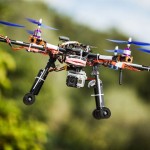 Over the last few years there have been numerous attempts to use technology to both understand traffic flows in our cities and then to better manage them.
Over the last few years there have been numerous attempts to use technology to both understand traffic flows in our cities and then to better manage them.
For instance, projects have used mobile data, Twitter content and travel cards have all been used to better understand traffic flows.
An unusual epicenter of this trend is to be found in Indonesia, where officials are using both mobile data but also drones to more effectively manage their traffic.
Easing the flow for Eid
Central to this is the Islamic celebration of Eid, which marks the end of Ramadan. The celebration sees millions of people travel to partake in the event with family.
The movement of people is particularly pronounced on the island of Java, which is home to roughly half of the countries 250 million people.
The nations roads have scarcely kept pace with the booming economy, with investment causing many highways to be inadequate for the traffic that now attempts to flow through them.
This year, police in Jakarta have deployed drones to monitor traffic as it flows through and out of it the city. The vehicles relay images in real-time back to the traffic management center, whereby police can make snap decisions as issues arise.
“If there’s bad traffic, if there’s an accident, we’ll be able to see it from above,” a spokesman for the police says.
Adding mobile to the mix
The police are also getting on board with mobile via the release of an app that lets drivers access the CCTV network through their smartphones and see traffic conditions on major roads for themselves.
The app is working alongside a growing list of services that are especially designed for Mudik. They offer directions to the nearest mosque, advise on fasting and so on. Both the state app and its market based alternatives are tapping into the burgeoning smartphone market in the country.
Alas, such innovations are still very much in their infancy, and there was little real evidence of change in behaviors during Mudik this year. Roads were still heavily congested with a number of fatal accidents during the exodus.
For the technological innovations to have a major impact will probably require a significant investment in the transport infrastructure, which may be somewhat harder to obtain.
So, for now at least, the technology will try and make the best of a bad job, which is what many of the travelers themselves do, regarding the traffic issues as a part of the festivities.
“You can enjoy the trip, making memories with your family,” one said. “That is something you cannot replace with social media, I think, the uniqueness of the ‘mudik’ tradition itself.”
Technology innovations are amazing. Nice post.
Technological advancements seem to finally be improving our roads, self driving cars are next!
Well, i hope it will be not only there, but also in portugal, here the roads are awful!